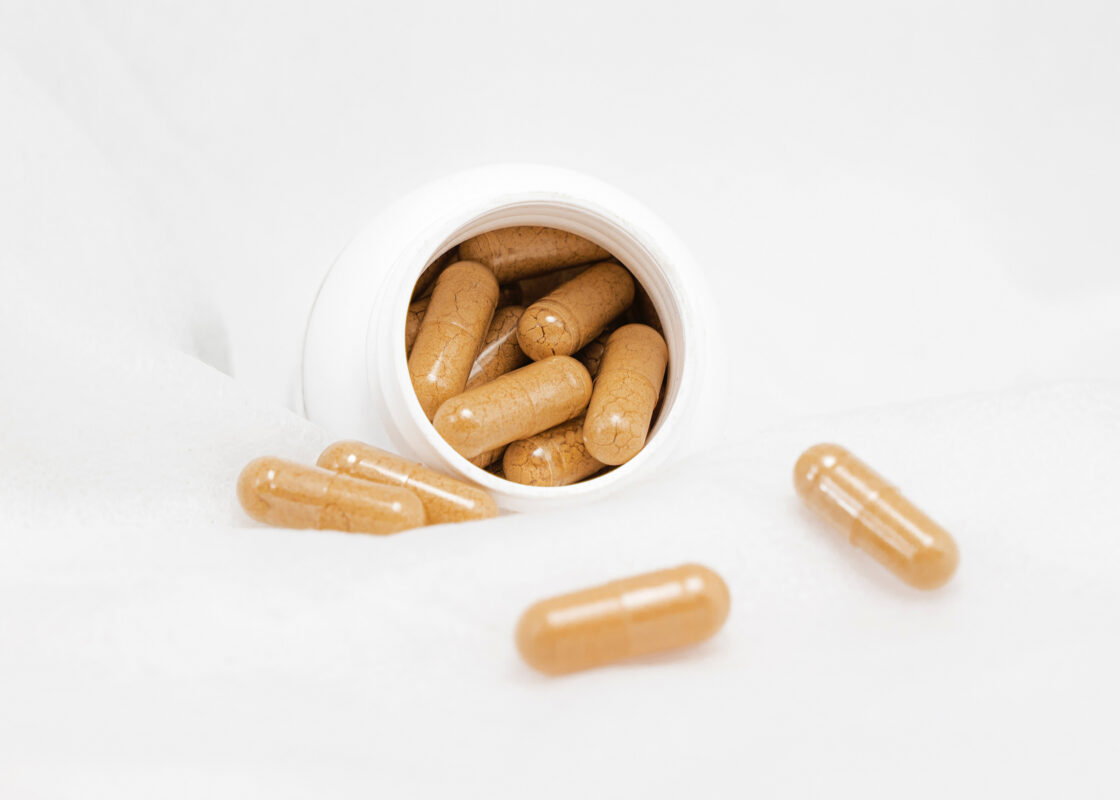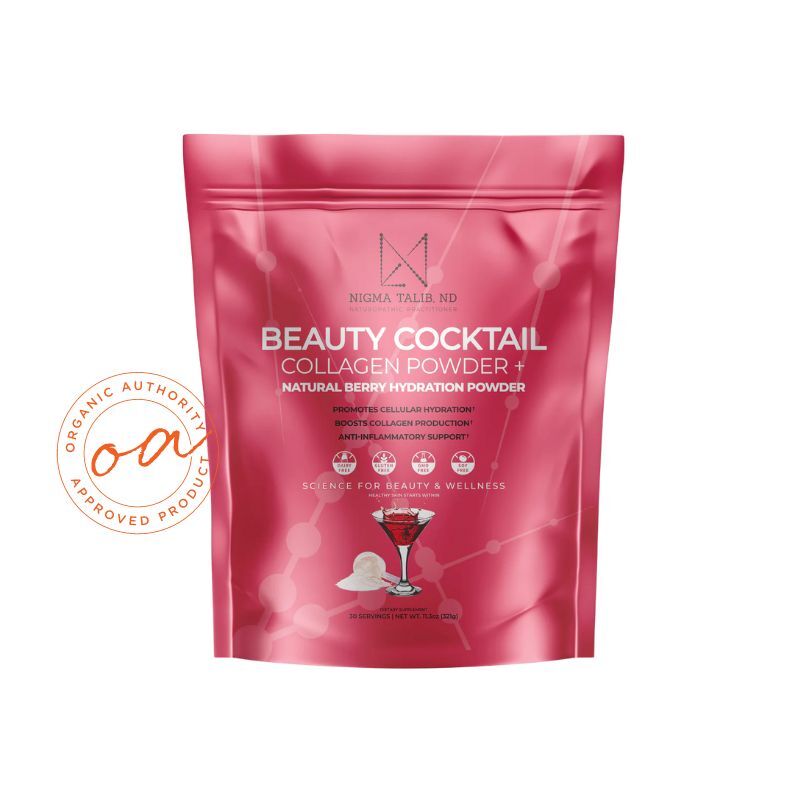Do Collagen Supplements Work on Wrinkles and Sagging Skin? Here’s What a Registered Dietician Says
Collagen production starts slowing as early as 18 years old. By age 40, we’re losing collagen at a rate of 1% a year. Yikes! A 2022 research review concluded that using collagen supplements reduces or delays skin aging. Collagen supplements can’t wipe out wrinkles, but they may improve the appearance of skin. Read on to uncover the best collagen supplements and powders for aging, wrinkles and sagging skin.

Ah, aging. That inevitable part of life that comes with plenty of great things, like wisdom, and a few not-so-great things, like backaches, wrinkles, and sagging skin.
While we can’t help you with the backaches, we can help you with the wrinkles and sagging skin by teaching you more about collagen supplements.
And we know a thing or two about collagen supplements for skin. Just check out our Guide to Collagen Powders, Peptides, and Supplements and our guides to Marine Collagen Peptides and Vegan Collagen.
We’ve also done the deep dive to help you uncover where your collagen really comes from and why you should be adding collagen powder to your coffee. We even created a recipe for a beyond delicious collagen powder mint chocolate shake (it’s really a smoothie but we like to call it a shake. Watch the video!).
In this article, we’re digging deep into the science behind collagen, looking specifically at how it’s been found to improve wrinkles and sagging skin. We’ll also answer frequently asked questions about collagen supplements and aging and tell you about the best collagen supplements for skin.
If you’ve tested collagen powders for yourself, we’d love for you to drop some first-hand knowledge in the comments below!
What is Collagen?

In case you missed our other collagen articles (see above) or need a refresher, let’s start with the basics. What is collagen?
Collagen is one of many proteins important to your body. Like other proteins, collagen is made of amino acids (mostly glycine, proline, and hydroxyproline).1
What’s unique about collagen is its importance to the health of your skin. Collagen is a structural protein needed to maintain not only skin but also connective tissue within your body. It’s absolutely vital for the strength and regeneration of your skin and other tissues.1
What is Hydrolyzed Collagen?
When looking at collagen supplements, you’ll probably notice that many of them contain hydrolyzed collagen.
Supplement brands choose to use hydrolyzed collagen because it makes digestion and absorption of the supplement easier. This is because hydrolyzed collagen is partially broken down before you even pop it in your mouth, giving your body less steps to take before the collagen can be utilized.
The hydrolyzed (or broken down) product of collagen is collagen peptides. And these collagen peptides have a low molecular weight, which leads to better absorption and use.2
What Degrades Your Skin’s Collagen?

We naturally lose collagen as we age. Believe it or not, collagen loss begins between the ages of 18 and 29. By age 40, we’re losing collagen at a rate of 1% a year.2 Tragic.
But Father Time isn’t the only thing causing all that collagen loss. There are other factors that diminish collagen, like smoking, excessive drinking, poor diet, and sun damage.3
Your skin needs collagen to remain dense and elastic.4 Collagen loss leads to wrinkles and sagging skin. A lack of collagen can also cause skin to appear dry, thin, and less firm.
Anyone else feeling lousy right about now? Good thing there are collagen supplements for sagging skin! More on that next.
Why Is Collagen Critical for Skin Elasticity, Hydration, & Firmness?
Collagen is THE protein for skin elasticity and firmness. Without collagen, consider yourself Kim Kardashian without her Skims (love ya, girl).
All jokes aside, collagen is the end-all-be-all when it comes to the structure and function of your skin. Collagen helps your skin stay strong, retain moisture, and appear smooth and firm.5
The secret to collagen’s strength may be in its structure. To make collagen, three strands of amino acids like glycine, proline, and hydroxyproline wrap around each other. What you’re left with is a tight, strong triple helix that can withstand the many stresses of life.6
The site of collagen synthesis is also important. Your body makes collagen deep within the layers of the skin, which means you need plenty of amino acids and other nutrients to make collagen throughout your life. With age, of course, this deep skin layer where collagen is made becomes weak, leading to wrinkles, dryness, and thinning.5
Fortunately, collagen powders and peptides can replace what your body can no longer make. Now that’s something to celebrate!
Can Collagen Powder Really Help Your Skin?

A lot of new research has come out recently on how collagen powder may or may not benefit your skin.
The majority of studies show that, yes, collagen powder really can help your skin. But, of course, there are caveats to this.
Some forms of collagen powder may be better than others, and it seems to matter how much collagen you take per day to see real results. For example, marine collagen has a lower molecular weight than other forms of collagen (like bovine, porcine, etc.). With a lower molecular weight, marine collagen is thought to be better absorbed once in your body.2
Overall, though, collagen powder supplements appear to improve skin elasticity and hydration and reduce wrinkles and roughness.7
Just a quick side note. Before starting collagen (or any supplement), please talk with your healthcare provider, especially if you’re taking any medications or have any health conditions. Collagen may not be appropriate for some people.
Research on Collagen and Skin Health

It’s time to get down to the nitty-gritty. Let’s look at some of the most recent and compelling research on collagen for aging skin.
A 2022 research review concluded that using collagen supplements reduces or delays skin aging. The review found that oral collagen supplements were especially beneficial for people with wrinkles and sagging skin. Additionally, collagen peptides were found to be better absorbed due to their low molecular weight, which allows the collagen to be evenly distributed across tissues.7
Researchers believe that oral collagen supplements (like powders) are better than topical collagen. This is because topical collagen creams don’t appear to reach the deep layers of the skin where collagen is synthesized in the same way collagen powders do.5
Another study compared hydrolyzed marine collagen powder to a placebo in women between the ages of 45 and 60. After the 12-week intervention, those who took the marine collagen powder were found to have a 35% reduction in their skin wrinkle scores. Marine collagen powder was also shown to improve skin elasticity, hydration, radiance, and firmness.8
Another review found that oral collagen supplements show promise for both short and long-term use. Again, oral collagen use was linked to less wrinkles and more skin elasticity, hydration, and density.9
Additional studies and reviews show the same thing, which is that oral collagen supplements provide benefits for aging skin. And it makes sense since we know that natural collagen production starts slowing down as early as 18 years old.2 The bottom line is that to improve the appearance of your skin you have to replace the collagen your body no longer makes.
Is There a Type of Collagen That’s Best for Wrinkles & Sagging Skin?

When it comes to choosing the best collagen supplements for sagging skin and wrinkles, there are a few things to keep in mind.
First, collagen peptides reign supreme. Recall that peptides are partially broken down already, which leads to better absorption and use of the collagen. Peptides have basically done some of the work for you already.
It’s also important to know about the different sources of collagen supplements. While some collagen supplements come from cows (bovine), others come from pigs (porcine), fish (marine), poultry, or eggs. There are also a few vegan-friendly options out there.
You may need to choose your collagen source based on dietary preferences or religious reasons. But if you’re open to any source, marine collagen may be your best bet.
Marine collagen is thought to be better for the environment. Plus, it’s highly bioavailable (in other words, it’s more easily absorbed by the body) due to its low molecular weight.8 It’s definitely got our vote.
We’re such big fans of marine collagen, we sourced a unique marine collagen formulation, Beauty Cocktail Collagen Powder + Natural Berry Hydration Powder, formulated by Dr. Nigma Talib, ND Naturopathic Doctor, that we’ve added it to the Organic Authority’s shop.
Every product we recommend goes through an in-depth vetting process. We’re talking from the ingredient sourcing, to the supply chain, to the clinically proven efficacy, we take it all in and only if it passes muster, do we give it our seal of approval. You can read more about the Organic Authority Approved process here.

What About Collagen Creams, Do They Work?
Collagen creams may improve aging skin, but probably not as well as collagen supplements.
Some research has shown topical collagen (like creams and serums) to have some positive effects on skin. In one study, for example, women who used topical collagen saw more skin elasticity by the end of the trial. However, in the same study, women who used oral collagen supplements had more substantial improvements in skin elasticity and even decreased pore size.10
But, according to another study, collagen creams just don’t reach the deeper layers of the skin as collagen supplements do. To really work, collagen peptides need to reach deep into the skin to re-form the collagen your skin needs to prevent wrinkles and sagging skin. Collagen creams simply don’t work that way.5
If this sounds confusing, it’s because it is.
Here’s the quick and dirty:
Collagen creams have shown some efficacy in treating aging skin, but not to the same degree as oral collagen supplements (like collagen peptide powders). Compared to collagen creams, oral collagen supplements are absorbed more efficiently, plus they eventually reach the deeper layers of your skin where the collagen magic happens. Collagen creams applied to the skin only work at the surface level.
Frequently Asked Questions
1. Can taking collagen reverse wrinkles and sagging skin?
As much as we hate to say it, wrinkles are a pretty inevitable part of life.
However, while collagen supplements can’t completely wipe out wrinkles forever, they sure can improve the appearance of your skin and even delay the onset of wrinkles and sagging skin depending on your age.7
Essentially, taking collagen can slow the aging process but not stop it altogether. But, really, what more could you ask for?
2. Which type of collagen powder is best for sagging skin?
Marine collagen peptides have come up time and time again as the best type of collagen powder for sagging skin.
Marine collagen is not only environmentally sourced but also has a lower molecular weight, which makes it easier for the body to absorb, than other collagen sources.8 This leads to faster, more efficient absorption of the collagen your skin craves.
3. Can collagen tighten saggy skin?
Sure can!
Collagen supplements have been shown to increase skin elasticity (ability to bounce back), hydration, and density.9 Denser skin = tighter skin.
With age, skin can start to sag and appear thinner as collagen dwindles. When you replenish collagen through oral collagen peptide supplements, you rebuild the density of your skin. This gives you skin that sags less and slays more.
4. Can taking collagen reverse sagging skin?
When it comes to sagging skin, taking collagen won’t make you appear 18 again (do you really want that anyway?), but you’ll definitely notice a difference.
Study after study has provided evidence that collagen improves the appearance of aging skin. Aside from diminishing wrinkles, collagen has also been found to increase skin elasticity, firmness, and radiance.8
We don’t think we know anyone who doesn’t want to be more radiant!
5. How long does it take for collagen to work on wrinkled skin?
The length of time it takes for collagen supplements to work may vary from one person to the next.
Many studies have shown improvements in skin after just one month of collagen use. One study that took place over the course of three months found collagen to have a significant impact on skin hydration, elasticity, roughness, and density.5
How soon collagen supplements kick in may also depend on the dosage. High doses may be more efficacious, but may also carry a bigger risk of side effects compared to small doses of collagen. As a general rule of thumb, follow product guidelines when it comes to dosing, or talk with your healthcare provider to find the right dose for your needs.
The Bottom Line
Collagen is the most abundant and important protein in your skin.
As your age goes up, natural collagen production goes down. Collagen supplements can fill the gap of what was once natural collagen and help delay and improve signs of skin aging, like wrinkles and sagging.
Collagen peptides are the best collagen for the skin. And marine collagen peptides are the best source due to their increased bioavailability.
If you’re ready to start your collagen journey, look no further than the Organic Authority Shop!
Read More on Organic Authority

9 Natural Beauty Hacks to Stop Aging In Its Tracks
Is Hyaluronic Acid Your Anti-Aging BFF?
The 4 Most Important Dietary Supplements to Take on a Daily Basis
Sources:
1. https://link.springer.com/article/10.1007/s00726-021-03072-x
2. https://www.mdpi.com/1420-3049/24/22/4031
3. https://www.healthline.com/nutrition/collagen#collagen-loss
4. https://www.mdpi.com/2073-4360/13/22/3868
5. https://www.mdpi.com/2072-6643/11/10/2494
6. https://www.ncbi.nlm.nih.gov/books/NBK507709/
7. https://www.ncbi.nlm.nih.gov/pmc/articles/PMC8824545/
8. https://onlinelibrary.wiley.com/doi/full/10.1111/jocd.13676
9. https://pubmed.ncbi.nlm.nih.gov/30681787/
10. https://onlinelibrary.wiley.com/doi/10.1111/jocd.12893

